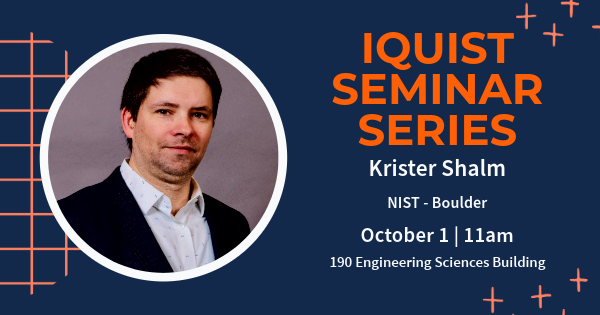
IQUIST Seminar: "Device Independence Day: Using Distributed Entanglement to Achieve a Quantum Advantage," Krister Shalm, University of Colorado Boulder
- Event Type
- Seminar/Symposium
- Sponsor
- IQUIST
- Location
- 190 Engineering Sciences Building, 1101 W Springfield Ave, Urbana, IL 61801
- Date
- Oct 1, 2024 11:00 - 11:50 am
- Speaker
- Krister Shalm, Sr. Research Associate, University of Colorado Boulder
- Contact
- Stephanie Gilmore
- stephg1@illinois.edu
- Views
- 257
- Originating Calendar
- IQUIST Seminar Series
Device Independence Day: Using Distributed Entanglement to Achieve a Quantum Advantage
Abstract: In 1943, Einstein wrote to Max Born, saying, "As I have said so many times, God doesn't play dice with the world." This discussion with Born was just one part of a much larger debate on the consequences of quantum theory on the nature of reality. Twenty-one years later, John Bell's famous inequality showed that no local realistic theory can predict all of the outcomes of measurements made on distant entangled particles. In 2015, the first conclusive experimental demonstrations of Bell's inequalities, performed under strict conditions, ruled out local realism.
Today, the inherent unpredictability of outcomes in a so-called loophole-free Bell test forms the cornerstone of a new class of "device-independent" quantum protocols, which have a provable quantum advantage over classical systems. This includes the generation of certifiable randomness, verifying the position of an entity, and securely distributing encryption keys. A major benefit of these protocols, compared to other classical and even quantum approaches, is that one does not need to trust the devices involved. For example, a hacker could control the source of entanglement and some of the measuring devices, yet still be unable to compromise the security of the results.
In this talk, I will discuss our group's work on developing and implementing the first device-independent randomness protocols that operate with a provable quantum advantage. The randomness generated from these experiments is as close to being truly unpredictable as nature allows. To borrow from Einstein, it is the closest one can come to throwing "God's dice." We have recently launched a service that makes this quantum randomness publicly available in the form of a randomness beacon. I'll also briefly discuss our recent work on developing the first device-independent position verification protocols, as well as our efforts to build all-optical, scalable quantum networks capable of carrying out device-independent protocols over metropolitan scales.
Bio: Krister Shalm is an experimental quantum physicists working at the National Institute of Standards and Technologies since 2012. His research focuses on studying the fundamental properties of light to develop new quantum technologies. He received his PHD in physics from the university of Toronto in 2010, and subsequently performed postdoctoral work at the Institute for Quantum Computing in Waterloo, Canada. Krister's work on entanglement has received widespread international recognition. When Krister isn't in the lab or sharing his love of science, he can be found swing dancing.
To watch online go to the IQUIST youtube channel: https://www.youtube.com/channel/UCCzAySwQXF8J4kRolUzg2ww
For Zoom link you may check the IQUIST calendar weekly email or contact Stephanie Gilmore (stephg1@illinois.edu). To subscribe to our weekly email for event announcements, please go to https://lists.illinois.edu/lists/subscribe/iquist-announcements.